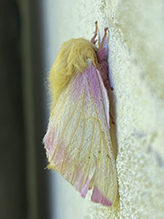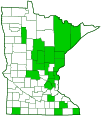Rosy maple moth
(Dryocampa rubicunda)
Conservation • Description • Habitat • Ecology • Distribution • Taxonomy
| Hodges # | 7715 |
||
Conservation Status |
|||
| IUCN Red List | not listed |
||
| NatureServe | N5 - Secure SNR - Unranked |
||
| Minnesota | not listed |
||
Description
Rosy maple moth is a common, small, silkworm moth. It occurs in the united States and southern Canada east of the Great Plains. Caterpillars are found feeding on the leaves of hardwood trees, especially red maple, silver maple, and sugar maple, but also boxelder and oak. Adults do not feed.
The adult is 1″ (26 mm) in length and has a wingspan of 1¼″ to 2 3⁄16″ (32 to 55 mm). It is a medium-sized moth but one of the smallest royal silkworm moths.
On males, the antennae are feather-like, with branches on both sides of the central axis (bipectinate). On females, the antennae are thread-like, unbranched.
The color is highly variable. The thorax is densely covered with long hairs that may be bright yellow, pale yellow, cream-colored, or white. The wings are rosy pink except for a broad median area which can also be bright yellow, pale yellow, cream-colored, or white. Sometimes the subterminal area is the same color as the median area. The legs are always rosy pink. A completely white form, called alba, occurs in Missouri.
The mature larvae, called green-striped mapleworm, is pale bluish-green or whitish-green with seven narrow, dark green stripes. On the second segment of the thorax (T2) there are two long black horns. On the abdomen there is a row of short black spines in the dorsal, subdorsal, and subspiracular areas. The subspiracular spines are the longest. There is often a rosy patch below the breathing pores (spiracles) on the seventh and eighth abdominal segments (A7 and A8). The head is beige to orangish-brown.
Size
Total length: 1″ (26 mm)
Wingspan: 1¼″ to 2 3⁄16″ (32 to 55 mm)
Similar Species
Habitat
Deciduous forests, woodlands, and bottomlands
Ecology
Season
One generation per year: May to August.
Behavior
Adults are active at night and will come to lights.
Young caterpillars, in the first three stages (instars), feed in groups. Older caterpillars feed alone.
Life Cycle
The female lays groups of 10 to 30 eggs on leaves of a host tree.
Pupa overwinter in a shallow chamber in the ground.
Larva Food/Hosts
Leaves of mostly maple trees, especially red maple, silver maple, and sugar maple, but also boxelder and oak.
Adult Food
Adults do not feed
Distribution |
||
|
Sources 21, 24, 29, 30, 71, 75, 82, 83. Biodiversity occurrence data published by: Minnesota Biodiversity Atlas (accessed through the Minnesota Biodiversity Atlas Portal, bellatlas.umn.edu, 10/5/2025). |
|
| 10/5/2025 | ||
Occurrence |
||
|
||
Taxonomy
Order
Lepidoptera (Butterflies and Moths)
Superfamily
Bombycoidea (Hawk, Sphinx, Silk, Emperor, and Allied Moths)
Family
Saturniidae (Emperor and Giant Silk Moths)
Subfamily
Ceratocampinae (royal moths)
Genus
Dryocampa (rosy maple moths)
Subordinate Taxa
Synonyms
Dryocampa alba
Dryocampa pallida
Dryocampa roseilinea
Dryocampa semialba
Dryocampa sperryae
Common Names
rosy maple moth (adult)
green-striped mapleworm (larva)
Glossary
Instar
The developmental stage of arthropods between each molt; in insects, the developmental stage of the larvae or nymph.
Spiracle
A small opening on the surface of an insect or arachnid through which it breathes.
Visitor Photos
Share your photo of this insect.
This button not working for you?
Simply email us at info@MinnesotaSeasons.com.
Attach one or more photos and, if you like, a caption.
Stephanie Selb |
 |
| count: 3 |
MinnesotaSeasons.com Photos
|

Slideshows
Rosy Maple Moth (Dryocampa rubicunda)
Andree Reno Sanborn

Visitor Videos
Share your video of this insect.
This button not working for you?
Simply email us at info@MinnesotaSeasons.com.
Attach a video, a YouTube link, or a cloud storage link.
Other Videos
LIVING COTTON CANDY !!! rosy maple moth (Dryocampa Rubicunda)
The Mothologist
Cutest Moth: Pink Fluffy Rosy Maple Moth (Dryocampa rubicunda)
Bart Coppens
Rosy maple moth (Dryocampa rubicunda)
Harvestmite



